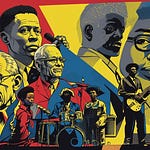Greetings Reggaologist!!
In a year that marks significant shifts in the reggae music landscape, the 2025 Grammy nominations present a fascinating study in contrasts.
The elimination of the traditional shortlist process and the selection of just five nominees from a pool of 75 contenders signals more than just a procedural change—it represents a broader transformation in how reggae music is being evaluated and celebrated on the global stage.
Breaking Tradition: The Shortlist's Absence
The decision to forgo the shortlist stage raises important questions about recognition within the genre. Historically, the shortlist has served as a crucial acknowledgment mechanism, offering artists a form of industry validation even if they didn't make the final cut.
Its absence this year potentially narrows the pathway for emerging artists to gain institutional recognition, though it may also streamline what has often been criticized as an overly complex nomination process.
The implications of this change extend beyond mere procedure. For emerging artists, particularly those from Jamaica's vibrant music scene, the shortlist has traditionally served as a stepping stone to broader international recognition.
Its elimination could potentially create a steeper climb for newcomers seeking to break into the global market.
The First-Timers Paradox
Perhaps the most intriguing aspect of this year's nominations is the presence of three first-time nominees, each representing different facets of reggae's evolution:
Shenseea: Breaking New Ground
Shenseea's nomination for "Never Gets Late Here" represents more than just personal achievement; it symbolizes the growing influence of women in a traditionally male-dominated genre. Her contemporary approach to reggae fusion challenges conventional genre boundaries while maintaining authentic Caribbean roots, marking a significant evolution in reggae's sound and representation.
The Bob Marley Phenomenon
The "Bob Marley: One Love" soundtrack's nomination presents a fascinating paradox. While technically a first for the legendary artist, it feels almost surreal given Marley's foundational role in reggae music. This nomination raises important questions about legacy, adaptation, and how we continue to celebrate iconic artists in modern contexts. The various artists format of the album also speaks to Marley's enduring influence on contemporary musicians.
Vybz Kartel's Controversial Rise
Vybz Kartel's nomination for "Party With Me" arrives at a particularly complex moment. Following a decade-long legal battle, his nomination forces the industry to grapple with challenging questions about separating artistic merit from personal controversy. The inclusion of "Party With Me" suggests a potential shift in how the Grammy committee approaches artists with complicated personal histories.
Veterans and Evolution
The Wailers' Legacy
The Wailers' second nomination with "Evolution" represents more than just another accolade. It demonstrates the band's ability to maintain relevance while honoring their historic role in reggae's development. Their continued evolution raises interesting questions about authenticity and adaptation in modern reggae.
Collie Buddz: The Bridge Builder
Collie Buddz's return to the nominations, this time with a solo album, exemplifies the global reach of contemporary reggae. His work often bridges traditional reggae elements with modern production techniques, creating a sound that appeals to both purists and new audiences.
The Politics of Recognition
The notable omissions from this year's nominations—Masicka's "Generation of Kings," Bugle's "Apex," and Jah Lil's "When A Man Crys"—highlight significant tensions within the reggae community.
These absences raise critical questions about the relationship between local Jamaican industry perspectives and international recognition.
The RIAA Membership Factor
The limited representation of Jamaican industry professionals in the Recording Industry Association of America (RIAA) continues to influence nomination patterns. This structural issue affects not just the nominations but the very definition of what constitutes "Grammy-worthy" reggae music.
Cultural Authenticity vs. Global Appeal
The selections reveal an ongoing tension between maintaining cultural authenticity and achieving international commercial success. This balance becomes increasingly complex as reggae continues to evolve and incorporate influences from other genres.
Industry Implications
The Streaming Effect
The modern digital landscape has transformed how reggae music reaches global audiences. Streaming platforms have democratized access to music but may also influence which artists receive Grammy recognition, potentially favoring those with stronger digital presences.
Production Standards and Global Competition
The technical quality of productions now plays a crucial role in Grammy consideration, sometimes creating challenges for artists working with limited resources. This raises questions about access and opportunity within the genre.
As we approach the 67th Grammy Awards, these nominations reflect broader tensions within reggae music: between tradition and innovation, between Jamaican roots and global appeal, between artistic merit and commercial success.
The elimination of the shortlist process, while efficient, may have unintended consequences for the genre's development and recognition pathways.
Here are five things for Future Considerations
- The need for more Homegrown members that better represent reggae's cultural origins
- The potential impact of digital streaming on future nominations
- The role of major labels versus independent productions in Grammy recognition
- The balance between preserving traditional reggae elements and embracing evolution
The 2025 nominations ultimately present a complex picture of a genre in transition, maintaining connections to its rich heritage while embracing new voices and expressions.
Whether this represents a positive evolution or a concerning departure from tradition remains a matter of debate, but it certainly signals a pivotal moment in reggae's ongoing story.
As the February 2nd, 2025 award ceremony approaches, these nominations serve as a mirror reflecting both the achievements and challenges facing reggae music in the modern era.
The outcome will likely influence discussions about representation, authenticity, and evolution in reggae music for years to come.
Lloyd 'Reggaeology' Laing
Music Business Analyst and Advocate for Fair Pay. Follow @Reggaeology Everywhere














Share this post